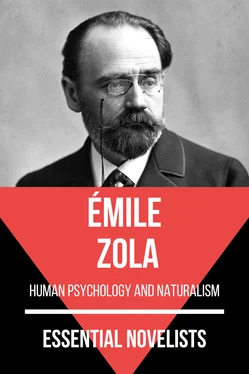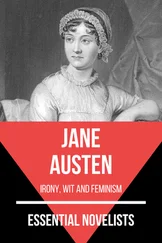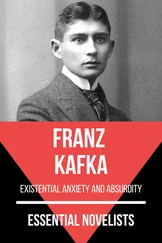"Eh? What stories?"
"Why, she has men! First, the engineer."
"That lean, little creature! Oh, he's too small! She would lose him in the sheets."
"What does that matter, if it amuses her? I don't trust a woman who puts on such proud airs and never seems to be pleased where she is. Just look how she wags her rump, as if she felt contempt for us all. Is that nice?"
The visitors went along at the same slow pace, still talking, when a carriage stopped in the road, before the church. A gentleman of about forty-eight got out of it, dressed in a black frock-coat, and with a very dark complexion and an authoritative, correct expression.
"The husband," murmured Levaque, lowering her voice, as if he could hear her, seized by that hierarchical fear which the manager inspired in his ten thousand workpeople. "It's true, though, that he has a cuckold's head, that man."
Now the whole settlement was out of doors. The curiosity of the women increased. The groups approached each other, and were melted into one crowd; while bands of urchins, with unwiped noses and gaping mouths, dawdled along the pavements. For a moment the schoolmaster's pale head was also seen behind the school-house hedge. Among the gardens, the man who was digging stood with one foot on his spade, and with rounded eyes. And the murmur of gossiping gradually increased, with a sound of rattles, like a gust of wind among dry leaves.
It was especially before the Levaques' door that the crowd was thickest. Two women had come forward, then ten, then twenty. Pierronne was prudently silent now that there were too many ears about. Maheude, one of the more reasonable, also contented herself with looking on; and to calm Estelle, who was awake and screaming, she had tranquilly drawn out her suckling animal's breast, which hung swaying as if pulled down by the continual running of its milk. When M. Hennebeau had seated the ladies in the carriage, which went off in the direction of Marchiennes, there was a final explosion of clattering voices, all the women gesticulating and talking in each other's faces in the midst of a tumult as of an ant-hill in revolution.
But three o'clock struck. The workers of the earth-cutting, Bouteloup and the others, had set out. Suddenly around the church appeared the first colliers returning from the pit with black faces and damp garments, folding their arms and expanding their backs. Then there was confusion among the women: they all began to run home with the terror of housekeepers who had been led astray by too much coffee and too much tattle, and one heard nothing more than this restless cry, pregnant with quarrels:
"Good Lord, and my soup! and my soup which isn't ready!"
––––––––

WHEN MAHEU CAME IN after having left Étienne at Rasseneur's, he found Catherine, Zacharie, and Jeanlin seated at the table finishing their soup. On returning from the pit they were always so hungry that they ate in their damp clothes, without even cleaning themselves; and no one was waited for, the table was laid from morning to night; there was always someone there swallowing his portion, according to the chances of work.
As he entered the door Maheu saw the provisions. He said nothing, but his uneasy face lighted up. All the morning the emptiness of the cupboard, the thought of the house without coffee and without butter, had been troubling him; the recollection came to him painfully while he was hammering at the seam, stifled at the bottom of the cutting. What would his wife do, and what would become of them if she were to return with empty hands? And now, here was everything! She would tell him about it later on. He laughed with satisfaction.
Catherine and Jeanlin had risen, and were taking their coffee standing; while Zacharie, not filled with the soup, cut himself a large slice of bread and covered it with butter. Although he saw the chitterlings on a plate he did not touch them, for meat was for the father, when there was only enough for one. All of them had washed down their soup with a big bumper of fresh water, the good, clear drink of the fortnight's end.
"I have no beer," said Maheude, when the father had seated himself in his turn. "I wanted to keep a little money. But if you would like some the little one can go and fetch a pint."
He looked at her in astonishment. What! she had money, too!
"No, no," he said, "I've had a glass, it's all right."
And Maheu began to swallow by slow spoonfuls the paste of bread, potatoes, leeks, and sorrel piled up in the bowl which served him as a plate. Maheude, without putting Estelle down, helped Alzire to give him all that he required, pushed near him the butter and the meat, and put his coffee on the fire to keep it quite hot.
In the meanwhile, beside the fire, they began to wash themselves in the half of a barrel transformed into a tub. Catherine, whose turn came first, had filled it with warm water; and she undressed herself tranquilly, took off her cap, her jacket, her breeches, and even her chemise, habituated to this since the age of eight, having grown up without seeing any harm in it. She only turned with her stomach to the fire, then rubbed herself vigorously with black soap. No one looked at her, even Lénore and Henri were no longer inquisitive to see how she was made. When she was clean she went up the stairs quite naked, leaving her damp chemise and other garments in a heap on the floor. But a quarrel broke out between the two brothers: Jeanlin had hastened to jump into the tub under the pretence that Zacharie was still eating; and the latter hustled him, claiming his turn, and calling out that he was polite enough to allow Catherine to wash herself first, but he did not wish to have the rinsings of the young urchins, all the less since, when Jeanlin had been in, it would do to fill the school ink-pots. They ended by washing themselves together, also turning towards the fire, and they even helped each other, rubbing one another's backs. Then, like their sister, they disappeared up the staircase naked.
"What a slop they do make!" murmured Maheude, taking up their garments from the floor to put them to dry. "Alzire, just sponge up a bit."
But a disturbance on the other side of the wall cut short her speech. One heard a man's oaths, a woman's crying, a whole stampede of battle, with hollow blows that sounded like the shock of an empty gourd.
"Levaque's wife is catching it," Maheu peacefully stated as he scraped the bottom of his bowl with the spoon. "It's queer; Bouteloup made out that the soup was ready."
"Ah, yes! ready," said Maheude. "I saw the vegetables on the table, not even cleaned."
The cries redoubled, and there was a terrible push which shook the wall, followed by complete silence. Then the miner, swallowing the last spoonful, concluded, with an air of calm justice:
"If the soup is not ready, one can understand."
And after having drunk a glassful of water, he attacked the chitterlings. He cut square pieces, stuck the point of his knife into them and ate them on his bread without a fork. There was no talking when the father was eating. He himself was hungry in silence; he did not recognize the usual taste of Maigrat's provisions; this must come from somewhere else; however, he put no question to his wife. He only asked if the old man was still sleeping upstairs. No, the grandfather had gone out for his usual walk. And there was silence again.
But the odour of the meat made Lénore and Henri lift up their heads from the floor, where they were amusing themselves with making rivulets with the spilt water. Both of them came and planted themselves near their father, the little one in front. Their eyes followed each morsel, full of hope when it set out from the plate and with an air of consternation when it was engulfed in the mouth. At last the father noticed the gluttonous desire which made their faces pale and their lips moist.
Читать дальше













